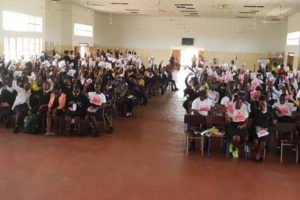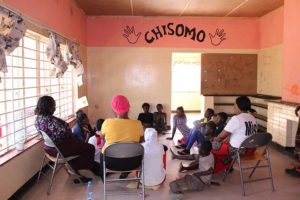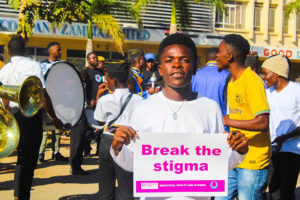DOREEN NAWA, Lusaka
What would have been a worry for the delay in menstruation, turned out to be an opportunity for Natasha Salifyanji Kaoma to observe and nurture her interests in menstrual hygiene. Natasha, a chief executive officer and co-founder of Copper Rose Zambia had her menstruation after her 15th birthday and this was a time for her to observe the happenings in other girls that had their menstruation start while at school.
Her passion for menstrual issues began when she was a teen and through her observation at school, she noticed that so many girls seemed unaware of what to do the day they begin to menstruate. I used to read a lot about puberty issues and because of this I developed interest and I started carrying two sanitary pads in my school bag on a daily basis way before I started menstruating. I was like a savior to many and whenever there was any crisis with any student, the pads I carried became handy, she says.
I used to read a lot about puberty issues and because of this I developed interest and I started carrying two sanitary pads in my school bag on a daily basis way before I started menstruating.
Now at twenty-five, Natasha runs Copper Rose Zambia, an organisation born from her experience in menstrual hygiene. She explains that her organisation deals in sexual and reproductive health in adolescents with special emphasis on menstrual hygiene. Her passion did not die even after leaving secondary school in 2007. A year later in 2009, she was enrolled at the University of Zambia (UNZA) in the school of Natural Sciences and she continued with her passion. She says her organisation first started as a mentorship programme to pair first year students with senior students at The Copperbelt University (CBU). A friend of mine who is also my sister, Faith Suwilanji Kaoma was at (CBU) and together, we realised there was a huge gap in sexual and reproductive health especially in adolescents, and that is how we started. Menstrual hygiene was one of the avenues identified to be lacking and least explored by organisations, and we directed our efforts towards it, Natasha says.
Eventually, in August 2015, the team did door-to-door fundraising at their respective university campuses and raised K3000 (US$300), which was used for the first outreach program at Makeni Konga Basic School. Since then, she has pioneered in championing menstrual health issues for underprivileged girls in Zambia. To date, her goal is to raise funds and support from various stakeholders in order to provide sanitary products to the girls every month. Because of the passion, Faith and I underwent various training on how to make [sew] pads. Currently, we have gone in communities to teach girls and women on how to sew the pads and also have women who have dedicated themselves to buying pads each month and give them to the organization, she says. In Zambia, like many other African countries, a high number of adolescent girls miss school when they have their period, as they cannot afford good sanitary hygiene. Natasha also runs a campaign known as Candid Pride which educates both male and female adolescents about menstrual hygiene, sexual health and HIV, subsequently helping them build their confidence during puberty.
I am inspired by the way she is breaking barriers on an issue that is considered a taboo in African culture. Many young men and women are being empowered by her campaign, she says. Natasha is also the country coordinator for the International Youth Alliance for Family Planning (IYAFP), where she mobilises young people to discuss and advocate access to contraceptives in their local community. Her personal vision is to empower one million women and girls by 2022 through mentorship (self-development strategies) and awareness of sexual and reproductive health rights.
Natasha holds of a Bachelor of Science in Human Biology from the University of Zambia and is currently pursuing a Bachelor of Medicine and Surgery.
In addition, she is an Associate Fellow of the Royal Commonwealth Society, an honorary fellowship given to young people for their role in improving the lives of commonwealth citizens. Born in 1992 in Livingstone, Natasha is the sixth born of seven children. She comes from a female-dominated family with only one male among her siblings. She did her primary school at Cosmopolitan and later qualified to Grade 8 and went to St Mary’s Secondary School in Lusaka where she completed in 2007. And in 2009, she was admitted to UNZA and is expected to graduate this year in July.
She feels early talk about menstruation among parents and their girl children is a good idea. Natasha says considering that girls get their first period as early as eight years old and as late as 15, it is vital that the issue be introduced to them early so that the girls are psychologically prepared. If you prepare your daughter for what is coming, it will make the experience much smoother for her. Armed with the facts and knowing that she is going to experience what all girls have been through since time immemorial, she will be able to take it in stride and possibly even celebrate it as the rite of passage it is, Natasha says.
Currently, there are still many cultures beliefs, myths and taboos relating to menstruation which instill fears and uncertainty among girls. There are a lot of social norms or unwritten rules and practices about managing menstruation and interacting with menstruating women, hence the need for parents to take an interest and clear such from the girls minds. Natasha says some of these are helpful but others have potentially harmful implications. Cultural norms and religious taboos on menstruation are often compounded by traditional association with evil spirits, shame and embarrassment surrounding sexual reproduction. Most striking is the restricted control which many girls have over their mobility and behaviour due to their impurity during menstruation,†she said. Despite menstruation being a natural process, Natasha says it remains a taboo and is rarely talked about in most parts of the world hence the need for it to be talked about openly.



I love the testimony for Dr. Natasha. Keep it up